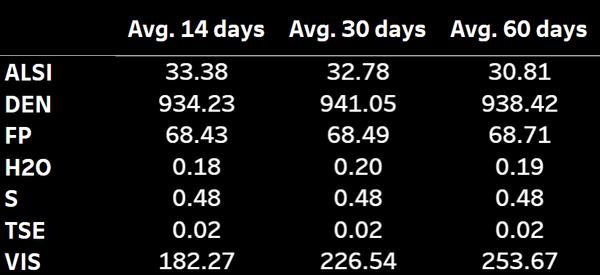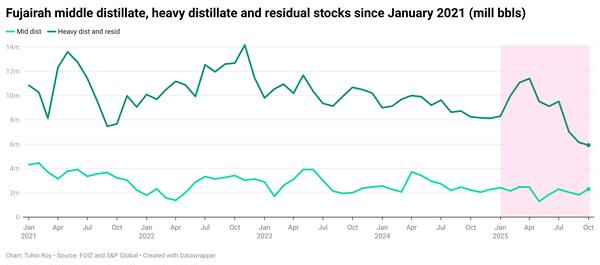East of Suez Market Update 13 Oct 2025
Most prices in East of Suez ports have moved down, and availability of all grades has improved in Zhoushan.
 IMAGE: Aerial view of Zhoushan, Zhejiang, China. Getty Images
IMAGE: Aerial view of Zhoushan, Zhejiang, China. Getty Images
Changes on the day from Friday, to 17.00 SGT (09.00 GMT) today:
- VLSFO prices down in Zhoushan ($11/mt), Singapore ($7/mt) and Fujairah ($5/mt)
- LSMGO prices unchanged in Singapore, and down in Zhoushan ($8/mt) and Fujairah ($7/mt)
- HSFO prices down in Zhoushan ($14/mt), Singapore ($5/mt) and Fujairah ($1/mt)
- B24-VLSFO at a $228/mt premium over VLSFO in Singapore
Zhoushan’s VLSFO price has fallen by $11/mt over the weekend — the sharpest drop among the three main Asian bunker ports. Despite the decline, Zhoushan’s VLSFO still holds a $22/mt premium over both Singapore and Fujairah.
VLSFO availability in Zhoushan has improved amid low bunker demand, bringing lead times down from 10–12 days last week to 5–7 days now. Lead times for HSFO and LSMGO have also shortened, from 10–12 days to 3–5 days.
In Taiwan, bunker supply remains stable. VLSFO and LSMGO deliveries can usually be arranged within two days at Keelung, Taichung and Hualien, and within three days at Kaohsiung.
Brent
The front-month ICE Brent contract has declined by $0.98/bbl on the day from Friday, to trade at $63.84/bbl at 17.00 SGT (09.00 GMT).
Upward pressure:
Oil has retained some ground after official drilling figures showed a decline in US oil rigs. The total number of oil rigs fell by four over the week to 418, according to Baker Hughes.
The US oil rig count is seen as an indicator of future oil production. It reflects how much oil drilling activity is happening or expected to happen in the shale sector.
In a tight market, any signal of reduced future supply can put upward pressure on Brent’s price.
Downward pressure:
Brent crude has lost momentum amid easing tensions in the Middle East.
The Israeli government and Hamas leaders have reached a deal for a ceasefire in the Gaza enclave in return for the release of all Israeli hostages held by the Iran-aligned militant group, according to media reports.
“This development [ceasefire announcement] has significantly cut the risk premium associated with the conflict,” remarked ANZ Bank’s senior commodity strategist Daniel Hynes.
The conflict, in its second year now, has destabilised the region, which is one of the biggest sources of the world’s crude oil.
“President Trump’s ceasefire announcement immediately took the premium out of the price of oil,” said Price Futures Group’s senior market analyst Phil Flynn.
The deal has also reduced the risk that Iranian proxies like the Yemen-based Houthis would continue to attack oil vessels transiting the Red Sea region, Flynn added.
By Tuhin Roy and Aparupa Mazumder
Please get in touch with comments or additional info to news@engine.online

Contact our Experts
With 50+ traders in 12 offices around the world, our team is available 24/7 to support you in your energy procurement needs.




